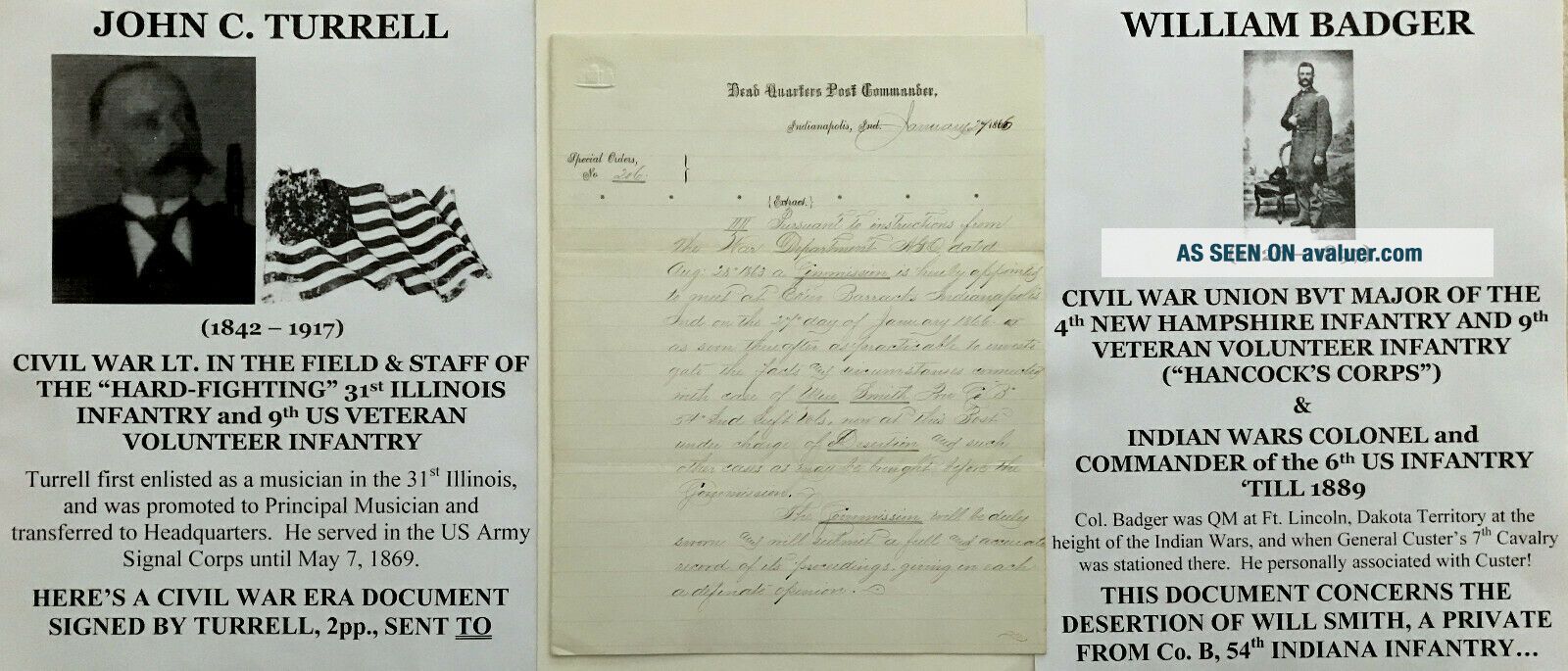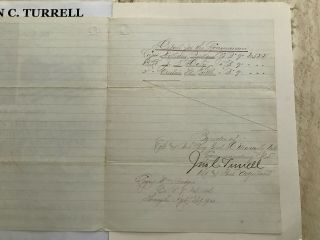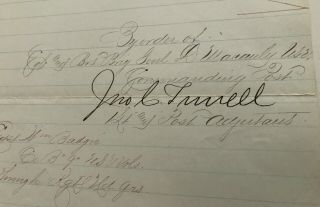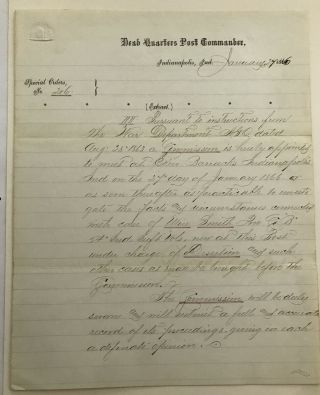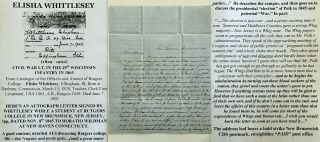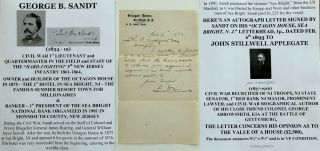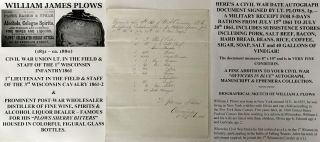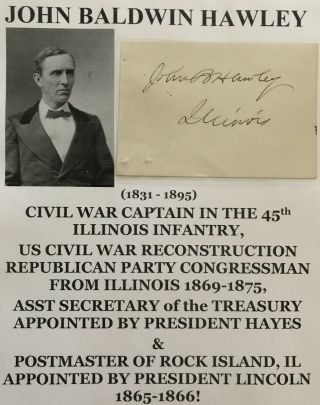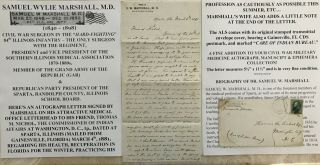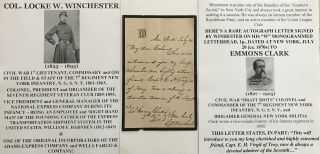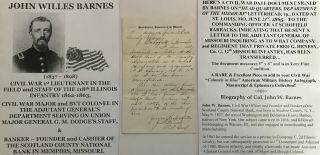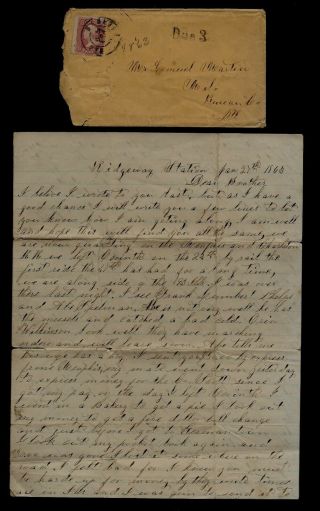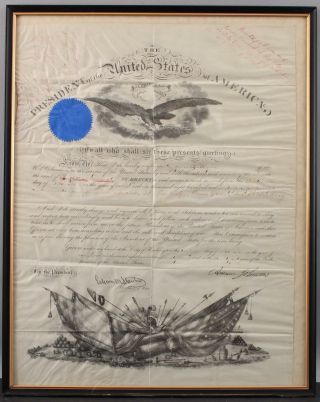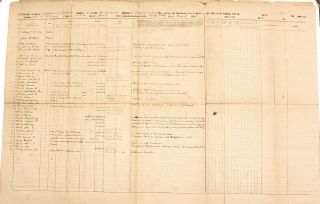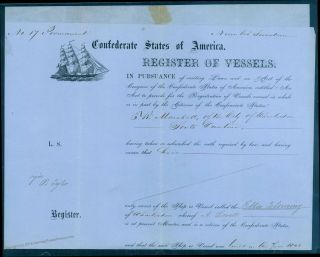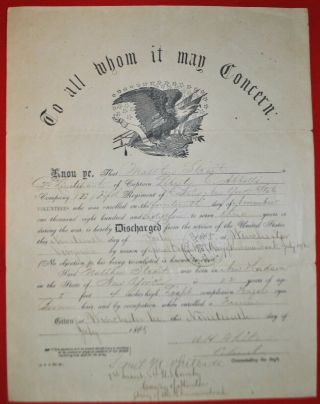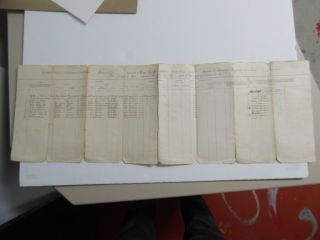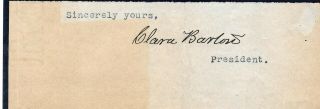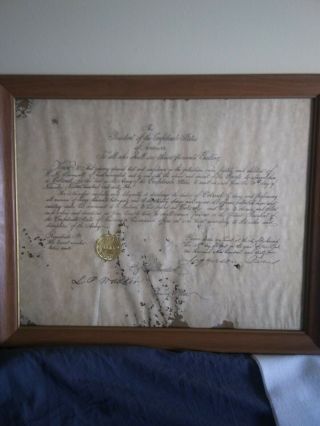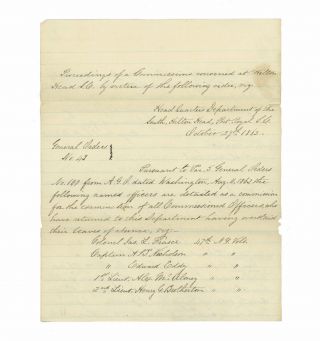CIVIL WAR LT 31st ILLINOIS INFANTRY 9th USVV MUSICIAN DESERTION DOCUMENT SIGNED
Item History & Price
| Reference Number: Avaluer:92824 | Modified Item: No |
| Country/Region of Manufacture: United States |
Bronx, Bronx County, New York, United States Place of Burial: Smithtown, Suffolk County, New York, United States Immediate Family: Husband of Anna Turrell
Father of Guy Hanford Turrell; John Cyprian Turrell and Edwin Lawrence Turrell >>::<< Civil War History of theIllinois
THIRTY-FIRST INFANTRY.
(three years) The Thirty-first Regiment of Illinois Infantry, except Companies I and K, was mainly composed of men from the southern part of the State, the counties of Williamson, Perry, , Franklin, Jackson, Johnson, Saline and Union furnishing the larger number. Its rendezvous was Camp Dunlap, Jacksonville, Illinois; but it was organized at Cairo by John A. Logan, and was there mustered into the service by Captain Pitcher, U. S. A., on the 18th of September, 1861, and went into camp of instruction in the Brigade of General McClernand. With less than two months, drill, the Regiment took part in the battle of Belmont, Mo. , November 7, 1861, cutting its way into the enemy camp, and with equal valor, but less hazard. Cutting its way out again. On the 7th of February, 1862, the Regiment was at Fort Henry Tenn., and after emerging from the muddy environments of that stronghold, it traversed the hills of Fort Donelson, and there, amid winter snows, on the 15th of the same month, it lost 260 men killed and wounded--the Regiment having performed, in this engagement the difficult evolution of a change of front to rear on tenth company, in the heat of the battle, among tangled brush and on uneven ground. From Donelson, the Regiment was transported by steamer to Shiloh, Tenn., and thence it moved towards Corinth, Miss., with the main body of the army, and reached that place only to find it evacuated by the enemy. From Corinth the Thirty-first marched to Jackson, Tenn., and the summer of 1862 was spent in guarding railroads, skirmishing in the country of the Forked Deer River, and scouting in the direction of Memphis, to Brownsville and beyond. Ordered to the support of Gen. Rosecrans, at Corinth, the Regiment reached that place in time to follow the retreating foe to Ripley, Miss., where the men fed on fresh pork, without salt, or crackers, or coffee. On this expedition it was engaged in the skirmishes of Chewalla and Tuscumbia, ending the 6th of October, 1862. The Regiment was with Grant in the first campaign against Vicksburg, sometimes called the Yokona expedition, and passed through Holly Springs to Coldwater, at which place the men, destitute of rations in consequence of the capture and destruction of supplies at Holly Springs by the enemy, showed their characteristic adaptability by carrying out at once the suggestion of Logan to convert the timber into ashes, and, by means of the ashes, the corn of the surrounding country into hominy. Upon the termination of this campaign the regiment, with the army under Grant, was transferred to a new field, that of the operations which finally resulted in the downfall of Vicksburg. On the 15th of January, 1863, it set out for Lagrange, Tenn., and thence went to Memphis, by way of Colliersville. Leaving Memphis March 10, 1863, it embarked for Lake Providence, La.; and after assisting in the attempts to open a route by water to a point below Vicksburg, it moved, upon the abandonment of the attempts, to Milliken's Bend, and thence to Wanesborough. Having crossed the Mississippi below Grand Gulf, April 30, 1863, the next day the Regiment, without waiting for rations, though hungry and weary enough, hurried forward to the support of the comrades then engaged in battle at Thompson's Hill, near Port Gibson, and quickly forming on McClernand's left, under the eyes of Generals Grant and Logan, it moved upon the right wing of the enemy at the charge step, routing him completely, and helping to secure a speedy victory. Governor Yates, in civilian garb of swallow tail coat and high shirt collar, and overflowing with enthusiasm and patriotism, witnessed this charge. After crossing the Bayou Pierre, the men of the Thirty-first again met and dispersed their foes at Ingram Heights, May 3, 1863, and pushed on to Raymond, where on the 12th the Regiment hurled from its front the fragments of a brigade which the enemy had thrown against the advance of Grant. Moving onward, in almost ceaseless march, it took part in the battle of Jackson, Miss, , May, 14, 1863, and thence at midnight, on the 15th, through drenching rain, it marched toward Vicksburg, to meet the enemy anew. About ten o'clock in the morning of the 16th the men spread their cartridges to dry in the sun, in an old field about five miles from Champion Hills, from which latter point was soon after heard the sound of battle. The men hastily gathered up their ammunition and seized their muskets, and the Regiment followed the head of the column at double-quick, effecting a formation with its brigade on the right of our embattled line, where it rested for a moment, the men lying on their faces while the hostile shells whistled and shrieked and exploded above them. At the command "attention" the line stood erect, with bayonets fixed; the Brigade-commander, General John E. Smith, gave the word; McPherson said with a smile, "give 'em Jesse!" and Logan shouted "remember the blood of your mammies! give 'em hell!" and then the brigade sprang forward, broke and routed the two column formation over which waved the Confederate flag, captured the opposing battery, turned its guns upon the retreating enemy, and took as many prisoners as there were men in the charging brigade. In this encounter there was crossing of bayonets and fighting hand to hand. Sergeant Wick, of Company B, used his bayonet upon his foe, and Sergeant Hendrickson, of Company C, clubbed his musket in a duel with one of the men in gray. From this point the Regiment, with the main army, followed the retreating enemy to his entrenched lines at Vicksburg, where it took part in the bloody assaults of the 19th and 22d of May; its gallant Lieutenant Colonel, Reece, meeting death by the explosion of a grenade while planting the Regimental Colors upon the ramparts. Here the flag received 153 bullets, and the staff was shot asunder in four places. During the sedge the Regiment took a prominent part in the operations against Fort Hill; and when the Fort was blown up, on the 25th of June, by the explosion of a mine beneath it, there came a time that tested the stuff the men were made of. Here in the night, in that crater remembered as the "slaughter pen, " the soldiers fighting by reliefs, and within an arms length of the enemy--some had their muskets snatched from their hands--under a shower of grenades and of shells lighted by port-fires, while the voices of Pearson, Goddard, Mooningham and others, rising at times above the terrific din of combat, cheered on their men--were deeds of valor performed which would adorn the heroic page. On the morning of July 4, 1863, the place of honor having been assigned to the Brigade, the Thirty-first Regiment marched proudly across the rents and chasms of Fort Hill into Vicksburg, Haying made the expedition to Monroe, La., under General Stephenson, the Regiment went into camp at Black River, Miss., the scene of Lawler's splendid victory, and here, on the 5th of January, 1864, three-fourths of the men again enlisted in the service. That night the men, formed in line, with lighted candles held in the shanks of their bayonets, marched to the quarters of General Force, commanding the Brigade, who appeared before his tent and catching the splendor from the candles full in his face cried out with enthusiasm, "Three cheers for the Thirty-first!" But the "boys" were not going to cheer for themselves and there were no others present to do it, so they stood in their ranks, silent and with military air, and cheered not nor stirred; whereupon the General shouted, "Cheer yourselves, boys! hip! hip!" and then the cheers were given with a will, followed by a "tiger" for the Union, and three groans for the Confederacy. The Regiment was with General Sherman in the campaign against Meridian, Miss., after which the re-enlisted men the "Veterans"-took their furloughs, starting for home the 19th of March, 1864. Having returned to the front, by way or Cairo, the Regiment camped from the 6th to the 15th of May at Clinton, on the Tennessee River, and thence marching by way of Rome, Ga., sometimes collecting, herding and driving beef-cattle, and sometimes skirmishing with the enemy, it joined Sherman's army at Ackworth Station. It was in the skirmish at Big Shanty, and at brush Mountain the assault upon Kenesaw on June 27, 1864; also in the battles around Atlanta, on the 21st, 22d and 28th of July, of which that on the 22d. was the most terrible, the men fighting sometimes on one side of the earthworks, sometimes on the other. The Regiment was also engaged in the battles of Lovejoy Station and Jones borough, and was with Sherman in the mock pursuit of Hood upon his invasion of Tennessee. Retracing its steps, the Regiment reached Atlanta on the Thirteenth of November, and on the 15th it there beganwith Sherman the triumphant march to the sea, and on it marched, with that magnificent army, cutting roads through tangled forests, bridging streams for the passage of the troops, tearing up railroad- tracks, twisting the rails "as crooked as rams, horns" "discovering" and devouring sweet potatoes and other provender, surging over the country "from Atlanta to the sea, " "shouting the battle cry of freedom" and proceeding by way of Millen, it arrived the 10th of December, 1864, at Savannah. Here the Regiment went into camp on the rice plantation of Dr. Owen, where the rice was consumed for food, the husks being first beaten off by means of wooden mortars and pestles appropriated from the slave quarters near by. One of the incidents of the day was the encountering of a battery mounted on a flat car, pushed along the railroad by a locomotive, 4th of January, 1865, the Thirty-first bade farewell to Savannah, and shipped on the steamer Harvest Moon, and after the novel experience and sights of a sea voyage, disembarked at Beaufort, S. C., where it remained, enjoying the luxury of fresh oysters at low prices, until the 13th. To this succeeded some skirmishing at Fort "Pole-'em-till-they-go, " as the men called it--which was evacuated by the enemy. On the 30th of January the march began through the Carolinas, by way of Salkahatchie, Orangeburg--which was captured, after some fighting by the Regiment's skirmishers, --Columbia scourged by destroying flames--Winsborugh, Cheraw, Fayetteville captured by foragers--and Bentonville--scenes of the last great struggle of Johnston's army, and the Regiment came out of the swamps, out of the pine forests, "out of the wilderness", the men ragged, dirty, many of them barefooted, to Goldsborough, N. C. , where it arrived the 24th of March, 1865, and where letters from home and news from the world were received. These and the prospects of the nearing of the end were cheering and refreshing to the men who for 54 days had been without communication with home or the world, and were weary with long marching and fighting. On the 14th of April, 1865, the Regiment was with the army at Raleigh, N. C. Signs of the ruin of the Confederacy and the dispersion of its armed forces were apparent on every hand. Soon came the surrender of Johnson's army--the only force which could oppose the onward march of the Union troops to Richmond, and the Regiment formed a part of the host to which that army surrendered. On the 9th of May the Regiment was at Richmond, on the 19th at Alexandria and on the 24th of May, with faded and tattered uniforms, tent with martial step and bearing, in column of company, eyes front, it marched through the principal avenues of the capital, in that grand review of the returning armies in presence of the great leaders, civil and military, of the republic--the most magnificent and imposing spectacle ever witnessed by the city of Washington. The end had been attained! Soon afterwards the Regiment was moved to Louisville, Ky., arriving at that place on 11th of June, where it was assigned to provost-guard duty. On the 19th of July, 1865, it was mustered out of the service, by Lieutenant Aug. P. Noyes, A. C. M., 3d Division 17th Corps. It was then moved to Springfield, Ill., where it arrived on the 23d of July, 1865 and there on the 31st of the same month, the men received their final discharge, and separated for their homes those who were left of them. At the time of the discharge there were present 25 officers and 677 enlisted men. When first organized the Regiment numbered 1, 130 men. It had recruited 700. The casualties, including men discharged before final muster out, amounted to 1, 128. In the course of its existence the Regiment had been commanded by four Colonels, and had had five Lieutenant-Colonels and six Majors. Of the 25 officers discharged at the final muster out, all save the chaplain had risen from the ranks. In the campaigns of Sherman this Regiment had marched 2, 076 miles. This part of its history is included in that of the Brigade to which it belonged--the 1st Brigade, 3d Division, 17th Corps Army Of Tennessee. The Regiment marched 2000 miles under Grant, and on expeditions other than those of Sherman. It served in the hostile States of Missouri, Kentucky, Tennessee, Mississippi, Louisiana, Georgia, Alabama, North Carolina, South Carolina and Virginia. Before January 1, 1863, the history of the Regiment is comprised in that of the 1st Brigade, 3d Division, Reserve Army of Tennessee. Always efficiently commanded, and evincing soldierly qualities in its first battle, the Regiment became in the days of its "veteran" existence. one of the best drilled in the service. It was, while encamped at Black River, Miss., after the Vicksburg campaigns, that the Regiment, under the skillful management of Lieutenant Colonel Pearson, attained that high degree of discipline and proficiency in drill for which it became known, and towards which it had been directed, under Logan and White, in the earlier days of the war. The latter fell at Donelson and deserved the title "The bravest of the brave." Colonel Pearson had seen service under General Prentiss before the organization of this Regiment, and early showed an aptitude for tactics and drill which made him a favorite with the field and staff, while his soldierly qualities displayed at Henry and Donelson endeared him to the rank and file. Hence he rapidly rose from the ranks, being promoted to Commissary Sergeant March 1, 1862, to Adjutant, May 16, 1862; to Major, February 4, 1863 by the unanimous vote of the officers; to Lieutenant Colonel July 1, 1863, and to Colonel September 26, 1864. On the 13th of March, 1865, he was breveted Brigadier 1865. General of Volunteers, for gallantry during the war. Many of the officers and soldiers of the Regiment deserve special mention and lasting remembrance, tent the space allotted forbids a more extended account. To some of the men were awarded medals for gallantry; among them Sergeant George W White, of Company C, who, severely wounded in the battle of Atlanta, July 22, 1864, resolutely and persistently refused to be carried to the rear. The fighting qualities of this Regiment were displayed in 14 battles and 25 skirmishes, of various degrees of importance. It witnessed the surrender of Buckner and the garrison at Donelson, the capitulation of Pemberton and his army at Vicksburg, the humiliation of Johnson and his force at Bentonville, and their final surrender near Raleigh. And a brilliant gem in its crown of glory is the fact of its organization as a "veteran" Regiment, at a time when the Union cause stood so much in need of trained and tried soldiers to complete the overthrow of armed rebellion, and to establish upon the ruins of anarchy and slavery "a government of the people, by the people, for the people" Source: Illinois Adjutant-General's Report, vol. 2, p. 574 <><::><>BIOGRAPHY of COL.WILLIAM BADGERCol. William Badger, born in GilmantonNH August 1, 1823 (Tombstone says year of birth, 1826). He was the son ofWilliam Badger Sr., who was the Governor of New Hampshire from 1834-36.Badger attended Gilmanton Academy andGraduated from Dartmouth College in 1848. He became Interested in Manufacturingand Milling. He was involved with Such companies as Union Mfg., Tioga Mfg andTilton Mills through 1859, until the Civil War.After college he resided at SanborntonNH; and at the age of 35 yrs enlisted on 7/25/1861 as a Captain of the 4th Reg.NH, Volunteers. Within a month Badger was Capt. of the Gilmanton ArtilleryCompany and was made a state recruiting officer with the rank of Captain, 10thReg, NH Militia. His enlistment with state the state militia ended on April 20, 1866. That same year he was commissioned as a Lieutenant in the 6th U.S. Infantry.He became a quartermaster with the 6th, and eventually was located at Ft.Buford and Ft. Lincoln, Dakota Territory, during the height of the Indian Wars.He was Quartermaster at Ft. Lincoln when Custer's 7th Cavalry was stationedthere, and personally associated with Gen. Custer. Badger was a member of Mt. LebanonMasonic Lodge No. 42, in New Hampshire, and while Quartermaster for the 6thInf., at Ft. Buford, D.T., he joined the historic Yellowstone Lodge No. 88, located there. This Masonic Lodge was the first charted Lodge in what is nowthe state of North Dakota, and included officers from the famed Col. JohnGibbon's Montana Column (7th Inf) which was involved in both the Custer Battleof the Little Big Horn and the Battle of the Big Hole near present day Wisdom, MT. There were 50 members in this Lodge and he was No.37. He was 43 yrs. oldwhen he joined Yellowstone on Nov. 21, 1872.Badger remained with the 6th Infantryuntil January 26, 1889, when was found physically unfit for active duty andretired. He was a member of GAR Post # 26 (Thomas G Stevenson) in Roxbury, MA, until his death.I am a proud member of the Universal AutographCollectors Club (UACC), The Ephemera Society of America, the Manuscript Societyand the American Political Items Collectors (APIC) (member name: JohnLissandrello). I subscribe to each organizations' code of ethics andauthenticity is guaranteed. ~Providing quality service and historicalmemorabilia online for over twenty years.~
WE ONLY SELL GENUINE ITEMS, i.e., NO REPRODUCTIONS, FAKES OR COPIES!



